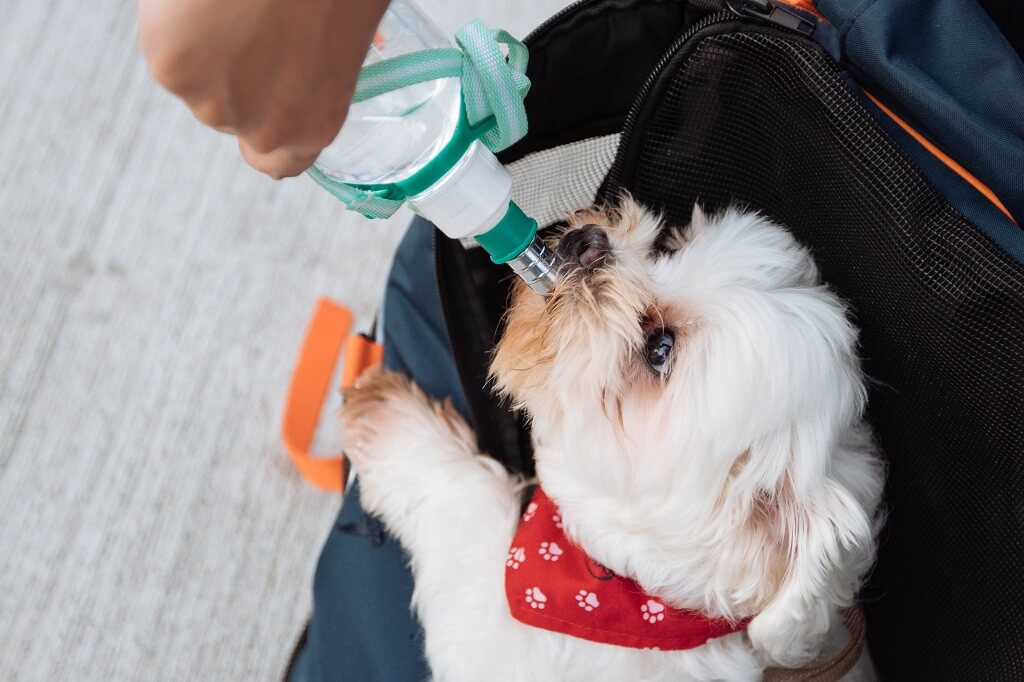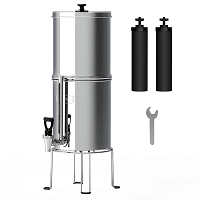Have you ever considered the type of water you're giving your dog or cat? Water is, after all, one of the essential nutrients for humans and pets, and it is consumed every day.
If you haven't, this article discusses various sources of drinking water and their potential health implications.
Why Is Healthy Water Necessary for Dogs?
Water is critical to mammal health. It constitutes about 55 to 75% of the body mass of warm-blooded creatures. Therefore people, dogs, and mammals' bodies are water-cooled engines. In a dog's body, panting and sweating through paw pads release water vapor, inducing gentle cooling.
Water is a lubricant for dogs' joints and muscles, cushioning spaces between individual cells and filling up all the minute hollows in a dog's body. Blood and water are principal in transporting oxygen to all canine body tissues, helping white blood cells produced by the dog's immune system move about in the body, fighting infections. Furthermore, water provides an environment for enzymes to digest food in a dog's stomach, converting it to the energy required for survival.
Is Bottled Water Suitable for Dogs?
Studies show that Americans drank 12.8 billion gallons of bottled water in 2016. Bottled water costs nearly 2000 times as tap water; therefore, is it a purer alternative? A 2008 study by the EWG discovered that 10 popular bottled water brands in the U.S contained 38 different water pollutants combinations. The pollutants in some brands include pharmaceuticals, bacteria, fertilizer residue, arsenic, industrial chemicals, and radioactive isotopes. These pollutants equaled the same level as the country's most polluted tap water systems. The majority of bottled water contains endocrine disruptor chemicals and artificial compounds that cause interference with hormone signaling.
Furthermore, plastic water bottles may contain bisphenol A (BPA), an industrial chemical that can seep into the water, causing various health risks. Most states do not mandate bottled water companies to disclose their water source; therefore, you don't know what's in your bottle of water. In addition, there are environmental effects – for instance, Americans use about 3 million plastic bottles every hour, and only less than 30 percent are recycled.
Can Dogs Drink Tap Water?
The answer to if dogs can drink tap water is yes. However, tap water is different, depending on where you live. For instance, your tap water may contain chemicals like pesticides, herbicides, or metals like chromium 6. Another important factor is the age of the water system to which your house is connected. Usually, homes built before 1986 have a problem with a neurotoxin like lead due to pipes or solder containing it. Furthermore, houses that get their water from nearby lakes have algae blooms in summer/spring. Another factor to consider is water hardness because it can cause urinary problems in dogs.
Why Should Dogs Take Healthy Water?
Water is critical to mammal's health because it constitutes between 55 and 75% of warm-blooded creatures' body mass. Therefore, people, dogs, and mammals' bodies are water-cooled engines. A dog's body releases water vapor by panting and sweating via paw pads to induce a gentle cooling.
Water is a lubricant for joints and muscles in dogs, cushioning the spaces between individual cells and filling up all the minute hollows in a dog's body. Water is a principal element of the blood, and it transports oxygen to all tissues in a canine's body. Water also helps the movement of white blood cells that a dog's immune system produces around the body to fight infections. Furthermore, water provides an environment that allows enzymes to digest food in a dog's stomach, converting it to energy for survival.
How To Purify Drinking Water at Home
A home water purification system is ideal for producing fresh, safe, and healthy drinking water. People who advocate for water filters unanimously agree that water filters can produce safe drinking water. Therefore, after considering home water purifiers' costs, effectiveness, and convenience, getting one is not difficult. The four major home water purifiers' include distillers, filters, ultraviolet purifiers, and reverse osmosis units.
Water Filters
Some simple water filters use an element called a medium to modify, trap, and absorb tap water pollutants. The King Tank water filter has sediment filters whose medium traps pollutants like a sieve. Municipal water treatment plants remove harsh pollutants from water. However, they can't remove viruses.
In addition, coarse filters can remove pollutants from dirty privately owned wells and water systems. Also, mini-filters are like self-contained gadgets that fasten to the kitchen valve's end, providing limited protection against water contaminants. The mini-filters have miniature sizes that lack adequate medium like carbon, and because the water flows fast over the medium, there isn't enough purification time. Nevertheless, these filters are inexpensive. However, you have to change the cartridge regularly.
Final Thoughts
It is essential to have a water filter to filter and purify water for your pets. Because all living things on earth require water, water bowls for cats and dogs are always full of refreshing liquid. Water constitutes 55 to 75% of an animal's body, making it crucial for your pet's overall well-being. Also, the amniotic sac is filled with water, and it is necessary for fetuses developing inside the body to protect its delicate developing organs. Therefore, from conception till death, a pet needs healthy water for filling and bathing billions of its body cells. The Big Berkey water filter has carbon filters that eradicate organic substances, bad smells, and bad tastes from water.




